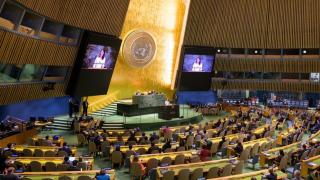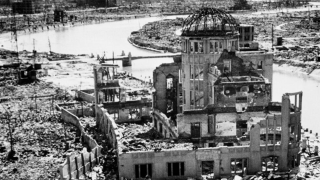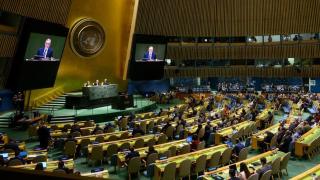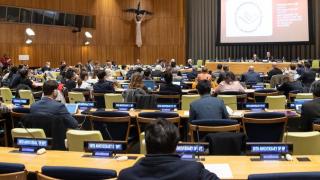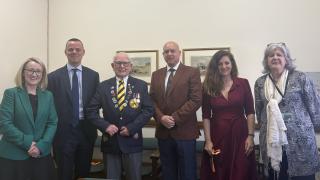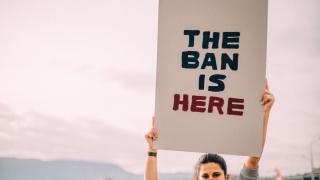
On 22 January 2021 the Treaty on the Prohibition of Nuclear Weapons enters into force. This briefing explains some of the issues at play in the international and UK context.
What is the nuclear ban treaty?
The Treaty on the Prohibition of Nuclear Weapons (TPNW) entered into force on 22 January 2021, three years after being negotiated at the UN General Assembly and 90 days after the 50th country, Honduras, joined the Treaty on 24 October 2020.
At present, the TPNW has 51 states parties and an overall supporter-base of at least 130 countries - over two thirds of the international community. The Treaty has the support of the United Nations Secretary-General, who sees it as an “important element of the nuclear disarmament and non-proliferation regime” as well as the support of global civil society through the International Campaign to Abolish Nuclear Weapons (ICAN) coalition who won the Nobel Prize in 2017. UNA-UK works with UNA Scotland and the Acronym Institute for Disarmament Diplomacy to coordinate ICAN’s UK coalition.
This Treaty completes the project to ban all three categories of weapons of mass destruction after biological weapons were banned in 1975, and chemical weapons in 1997.
How did it come about?
The initiative to create a new pathway for disarmament emerged in 2010, when governments at the Non-proliferation Treaty (NPT) Review Conference expressed their deep concern at the "catastrophic humanitarian consequences of any use of nuclear weapons". In 2012 and 2013, through NPT Preparatory Committees, the General Assembly's First Committee and an Open-Ended Working Group (to which the UK and other nuclear armed states were invited, but did not attend), growing numbers of states expressed a desire to intensify efforts to outlaw nuclear weapons. In 2013 - 2014, progressive states worked closely with civil society organisations to convene conferences in Norway, Mexico and Austria to explore the humanitarian impact of nuclear weapons. Over the course of these conferences - which were attended by over 120 states, UN agencies and civil society - the dangers of accidental use, the environmental devastation and the inability of the international community to mount a humanitarian response to a detonation were discussed. Impetus for a ban grew.
After the 2015 NPT Review Conference - the traditional forum for discussions on disarmament - ended without adopting an outcome document, and in the face of growing frustration from non-nuclear states at the perceived failure of nuclear states to live up to their NPT obligations, states in the General Assembly set up a second Open-Ended Working Group. The Group met in Geneva during 2016 (as before, nuclear weapons states did not participate) and concluded with a recommendation that formal negotiations should begin the following year on a treaty. That recommendation was adopted in the General Assembly in December 2016 with 113 states voting in favour, 35 against, and 13 abstentions. The UK voted against the resolution, joining other NATO members and US allies in opposing even the idea of negotiations.
Negotiations mandated by the General Assembly took place at the UN in New York during March, June and July 2017 attended by some 130 states and dozens of civil society organisations. The opening session included statements from Pope Francis and Peter Maurer, head of the International Committee of the Red Cross, as well as survivors from the devastating Hiroshima detonation on 6 August 1945. The final text was agreed on 7 July 2017 following a vote where 122 governments supported the Treaty, 1 voted against (the Netherlands) and 1 actively abstained (Singapore). The remaining countries, including all the world’s nuclear states, failed to even participate in negotiations. Japan - the only country to have suffered a nuclear attack - was another of the countries that declined to participate, citing doubts that the talks would "actually lead to the elimination of nuclear weapons, in cooperation with the nuclear weapon states".
The text’s finalisation opened the door for the process of gathering the ratifications required to bring it into force - a process which has now ended in success.
What is the UK’s attitude to the Treaty?
The UK, and other nuclear armed states, agreed to the 2010 NPT Conference outcome document which required states to “consider the legitimate interest of non-nuclear-weapon States”. The UK’s lack of engagement towards initiatives led by these states has therefore been surprising and concerning.
Instead, the UK has maintained its long-standing preference for a "step-by-step" approach through existing disarmament structures, including the NPT. However, many non-nuclear weapons states believe recent progress through the NPT has been too slow, with nuclear weapons states preferring to use the forum to focus on the issue of non-proliferation rather than their own obligations to disarm. This has raised questions over nuclear weapons states' commitment to the fundamental bargain at the heart of the NPT: the 185 non-nuclear signatories agree to refrain from developing nuclear weapons; in exchange, the five signatories that hold nuclear weapons (including the UK) must negotiate in good faith towards multilateral nuclear disarmament.
Nuclear armed states have done little to reassure the skeptics of their commitment to disarm. Indeed at times their approach has been needlessly antagonistic. In what many interpreted as an offensive move the US ambassador to the UN, joined by representatives from around 20 allies including the UK, held a press conference outside the negotiation room in March 2017 as non nuclear delegates, survivors of Hiroshima and the Pope were gathering to begin work on the ban. Following the adoption of this Treaty, the UK, along with France and the US, issued a statement saying the ban Treaty “will not enhance any country’s security, nor international peace and security. It will do the exact opposite by creating even more divisions at a time when the world needs to remain united in the face of growing threats.”
Such an approach is also unequivocally at odds with UN guidance on the issue. A statement made by the UN High Representative on Disarmament Affairs, speaking in UK Parliament in February 2018, implored the nuclear-states to be constructive in their approach to the TPNW, saying: “don’t ignore it, don’t attack it”.
A 2019 cross-party parliamentary report reinforced this, recommending that the Government modify its approach to the TPNW and look for opportunities to “work with [the TPNW’s] supporters towards the aims of Article 6 of the Nuclear Non-Proliferation Treaty”.
What difference will it make?
At an event organised by UNA-UK, Matthew Rycroft, then the UK's ambassador to the UN, insisted the TPNW will have "zero effect in the real world".
UNA-UK disagrees. Irrespective of the UK Government’s position, the TPNW’s impact will be felt.
- Scotland’s First Minister and Government are unambiguously committed to the TPNW, publicly opposing all aspects of the UK’s nuclear weapons policy
- Cities across Britain, including Manchester, Edinburgh, Oxford, Brighton and Hove, Norwich and Leeds, have signed up to support the Treaty’s implementation. Many more will follow
- Major banks, pension funds and sovereign wealth funds across Europe are divesting from nuclear weapons and related industries, informed by ICAN's "Don't Bank on the Bomb" campaign
- Anglican, Catholic and other faith leaders in the UK have openly endorsed the TPNW and called on the UK government to change its stance
- Internationally, the UK’s divisive approach to a process supported by a large majority of UN Member States damages the UK’s standing and puts strain on the UK’s relations with a large swathe of the international community
- The signatories to the TPNW’s refusal to engage with the global supply chains that provide nuclear weapons will make nuclear weapons more difficult to design, build, maintain, own, or ultimately use.
Moreover, the Treaty could play an important part in strengthening opposition to nuclear weapons. The support by a majority of states for a Treaty that regards nuclear weapons as unacceptable sends out a strong political and moral statement. Looking at other inhumane weapons - biological, chemical, landmines, cluster bombs - history has shown that over time such “norms” can play an important role in stigmatising and delegitimising them. Treaties can strengthen these norms.
The Treaty also provides a campaigning opportunity for civil society and parliamentarians. It has already mobilised the public: 77% of Britons support the Treaty.
What next?
UNA-UK is fully aware that there is no likelihood of the UK giving up its nuclear weapons and acceding to the TPNW any time soon. However, that should be the ultimate aim of UK policy, and indeed that is the promise the UK makes in its commitment to the NPT. The UK should reiterate that that remains its end goal by adopting a policy commitment to ultimately become a State Party to the TPNW.
In the meantime, the UK should engage with the TPNW, adopting a constructive approach towards the Treaty and acknowledge it as a legitimate part of the rules-based international system. In this manner they can help bridge the divide between nuclear and non-nuclear states, and strengthen the overall architecture of disarmament, all pillars of which need to support each other if the entire edifice is not to collapse.
Within this approach, the UK should:
- Announce the intention to attend any future Meeting of States Parties of the TPNW as an observer, to follow developments and avoid misconceptions;
- Provide technical expertise and other input within the TPNW framework where relevant, for example on: discussions of verification issues that will take place and on which the UK continues to do substantial work; and on activities to address ongoing human and environmental harm from past nuclear testing;
- Until such time that it becomes a State Party of the TPNW, voluntarily implement Article 6 of the TPNW on victim assistance and environmental remediation and publish details of actions taken;
- Foster a dialogue with countries and organisations working on the TPNW on how the Treaty can make an effective contribution to disarmament, including through making a positive, reinforcing impact on the disarmament pillar of the NPT.
The UK has a duty as a country that cares about international cooperation to participate on a project which two thirds of the world deem of central importance to their national security. For the UK to remain dismissive of the TPNW, while also not fulfilling its NPT obligations, undermines its role as a proponent of the international rules-based order.
Photo: The TPNW reaches 50 ratifications (c) ICAN | Aude Catimel

